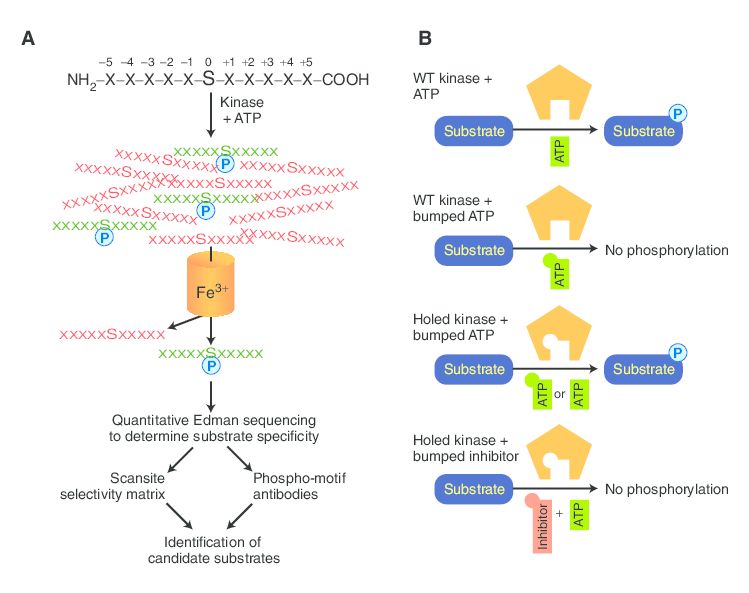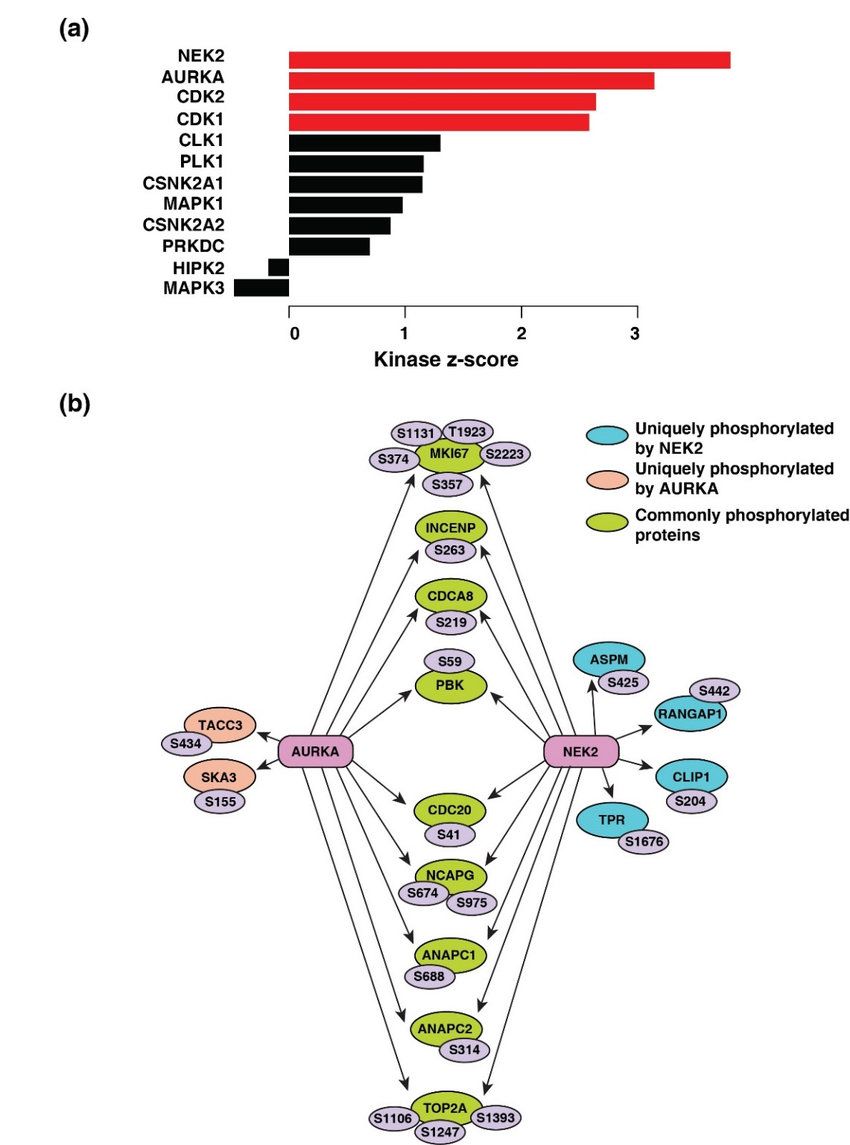In the dynamic field of biotechnology, Kinase Substrate Profiling has become a crucial method for researchers to explore complex cellular functions in depth. Kinases, enzymes that modify proteins by adding phosphate groups, are central to many cellular processes. Hence, identifying the specific substrates these kinases affect can significantly advance our knowledge of cellular processes and diseases.
Kinase Substrate Profiling is a specialized technique for identifying these substrates. By using this method, we can obtain detailed insights into how specific kinases operate within a cell and their role in various diseases. This knowledge is vital for developing targeted therapies and discovering new drugs, leading to more effective treatments.
 Schematic of two approaches for identifying substrates of protein kinases (Brendan D M. and Lewis C C., 2023)
Schematic of two approaches for identifying substrates of protein kinases (Brendan D M. and Lewis C C., 2023)
Service Process
Our Kinase Substrate Profiling service follows an extensive and detailed process which includes:
- Substrate Selection: This initial stage involves the careful selection of the most suitable substrates for the specific kinase in question. We understand that the choice of substrates significantly influences the validity and accuracy of the results. Therefore, we meticulously consider various factors for substrate compatibility and optimal functionality.
- Kinase Reaction: After the substrates have been appropriately selected, we then proceed to the kinase reaction stage. We ensure this process is executed with utmost precision and expertise, maintaining the correct conditions and parameters for the reaction to occur effectively. We acknowledge that the success of the experiment heavily depends on the accurate execution of this step.
- Substrate Detection: Post-reaction, we move on to the critical phase of detecting the phosphorylated substrate. In this step, we employ highly specialized techniques to accurately identify and quantify the modified substrates. We recognize that this process is a delicate task that requires precision and a deep understanding of the methodologies employed.
- Data Analysis: The final stage of our service process is the analysis of the accumulated data. We meticulously examine and interpret the generated data using sophisticated analytical techniques. This step allows us to identify potential substrates for the kinase, providing meaningful insights and conclusions about the kinase substrates.
Throughout each of these stages, we maintain close collaboration with our clients. We provide expert guidance and support to ensure the best possible results, and we value our clients' input and feedback at every step of the process. If you have any questions, need more information, or would like to discuss a potential project, please don't hesitate to contact us. Our team is always eager to help and share our expertise.
Applications
| Application |
Description |
| Drug Discovery |
Kinase substrate profiling plays a crucial role in drug discovery by identifying potential drug targets and aiding in the development of kinase inhibitors. Through this technique, researchers can analyze the specificity and activity of kinases, allowing for the design of more effective and selective drugs. Moreover, it enables the evaluation of drug candidates in terms of their impact on kinase signaling pathways, thereby facilitating the development of targeted therapies for various diseases. The insights gained from kinase substrate profiling contribute significantly to the discovery of novel treatments for conditions such as cancer, inflammatory disorders, and neurological diseases. |
| Cancer Research |
In cancer research, understanding the dysregulated signaling pathways that drive tumor growth and metastasis is essential for developing effective therapies. Kinase substrate profiling provides valuable insights into the role of kinases in cancer development and progression. By identifying aberrant kinase activity patterns specific to cancer cells, researchers can pinpoint potential therapeutic targets and develop precision medicine approaches. Additionally, kinase substrate profiling aids in elucidating the mechanisms of drug resistance in cancer, guiding the development of combination therapies to overcome resistance mechanisms and improve patient outcomes. |
| Signaling Pathway Study |
Kinases play pivotal roles in cellular signaling pathways, regulating various physiological processes such as cell proliferation, differentiation, and apoptosis. Studying kinase substrate profiles allows researchers to map out intricate signaling networks and understand how they are dysregulated in disease states. By identifying the substrates targeted by specific kinases, scientists can unravel the complexity of signaling cascades and uncover novel interactions between proteins involved in signal transduction. This deeper understanding of signaling pathways can lead to the development of more targeted and effective interventions for diseases ranging from cancer to metabolic disorders. |
| Biomarker Discovery |
Biomarkers are molecular indicators of physiological or pathological processes, and their discovery is crucial for early disease detection, prognosis, and monitoring of treatment response. Kinase substrate profiling enables the identification of kinase activity signatures associated with specific diseases or conditions, serving as potential biomarkers for diagnostic or prognostic purposes. By analyzing the phosphorylation patterns of substrate proteins, researchers can uncover biomarker candidates that reflect disease progression or response to therapy. These biomarkers hold promise for improving patient stratification, guiding treatment decisions, and facilitating the development of personalized medicine approaches tailored to individual patients' needs. |
Case Study
The findings from this case study indicate that phosphopeptide signatures across five cancer types anticipate Aurora kinase A (AURKA) and the serine/threonine protein kinase Nek2 (NEK2) as highly active kinase targets. Repurposing drugs aimed at these kinases may offer treatment options for a spectrum of cancer types. (a) Predicted upstream kinases enriched across five cancer types. Graph showing the positively regulated upstream kinases (red bars) predicted to be activated. (b) Substrates of kinases-serine/threonine-protein kinase Nek2 (NEK2) and aurora kinase A (AURKA) enriched across cancer types depicted by a schematic diagram.
 Kinase-substrate enrichment analysis (Barnali Deb., et al., 2020)
Kinase-substrate enrichment analysis (Barnali Deb., et al., 2020)
FAQs
Here are some Frequently Asked Questions (FAQs) about Kinase Substrate Profiling that cover its definition, importance, applications, and other key details. If you have more specific or detailed questions, don't hesitate to get in touch with us directly.
Q: What is Kinase Substrate Profiling?
A: Kinase Substrate Profiling is a highly specialized technique used in cellular biology to identify the specific substrates that a particular kinase acts upon within a cell. It's a key tool in understanding how kinases modify proteins and influence cellular processes.
Q: Why is Kinase Substrate Profiling important?
A: Kinase Substrate Profiling allows researchers to delve into the roles of specific kinases in cellular functions and diseases. By identifying the substrates of a kinase, we can understand how it influences cellular processes, thus providing valuable insights into disease mechanisms and potential therapeutic targets.
Q: How does Kinase Substrate Profiling contribute to drug discovery?
A: By understanding the specific substrates of a kinase, researchers can design targeted therapies to inhibit or enhance the kinase's activity. This knowledge aids in the development of more precise and effective treatments, accelerating the drug discovery process.
Q: What are the key steps in Kinase Substrate Profiling?
A: The key steps in Kinase Substrate Profiling include substrate selection, kinase reaction, substrate detection, and data analysis. Each step is crucial in ensuring the accuracy and reliability of the results.
Q: Can any kinase be profiled?
A: Yes, as long as the kinase is in a purified and active form, it can be profiled. This opens up a wide range of possibilities for studying different kinases and their roles in various cellular processes.
Q: How is the data interpreted?
A: The data from the Kinase Substrate Profiling is analyzed to identify potential substrates for the kinase. This involves a careful examination of the results and often requires expertise in the field.
Q: How long does profiling take?
A: The duration of the profiling process can vary depending on the specific requirements of the project, the kinase being studied, and the number of potential substrates.
Q: Can this technique be used for high-throughput screening?
A: Yes, Kinase Substrate Profiling can be adapted for high-throughput screening of kinase inhibitors. This makes it a powerful tool in drug discovery and development.
Q: Can you assist with data interpretation?
A: Absolutely, our team of experts can assist with data interpretation and further experimental design. We work closely with our clients to ensure they fully understand the results and can effectively apply this knowledge to their research.

































 Schematic of two approaches for identifying substrates of protein kinases (Brendan D M. and Lewis C C., 2023)
Schematic of two approaches for identifying substrates of protein kinases (Brendan D M. and Lewis C C., 2023) Kinase-substrate enrichment analysis (Barnali Deb., et al., 2020)
Kinase-substrate enrichment analysis (Barnali Deb., et al., 2020)